40 Employees Share What Happened When They Requested Some Time Off From Their Jobs
There’s nothing like a good, long holiday to get away from work, recharge your batteries, and give you a fresh perspective on what life is all about. There can be no quality work without quality rest, nearly everyone knows that. However, even though it seems completely natural to take some time off so you’re fresh and brimming with energy again, far from every employer is happy with that and, in the end, many employees feel guilty about asking to go on holiday.
That’s exactly the issue that Twitter user Lordsprout tackled in a viral online post. She said that the idea of “requesting” time off is “insane” and that we should be talking about “notifying” our employers when we won’t be at work. “They don’t own you; you simply sell them your time. You notify them as a courtesy so they can staff accordingly. They can’t dictate your life,” she said.
In response, some employees shared exactly what happened to them when they asked for some time off. You know, something that’s entirely normal. However, what they shared might just make your jaw drop with how unfair things seem.
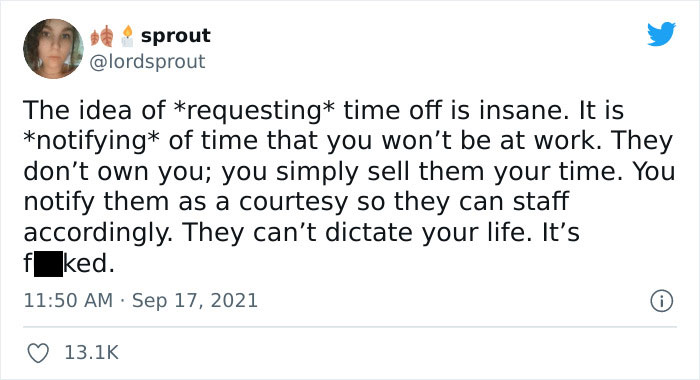
Image credits: lordsprout
#1
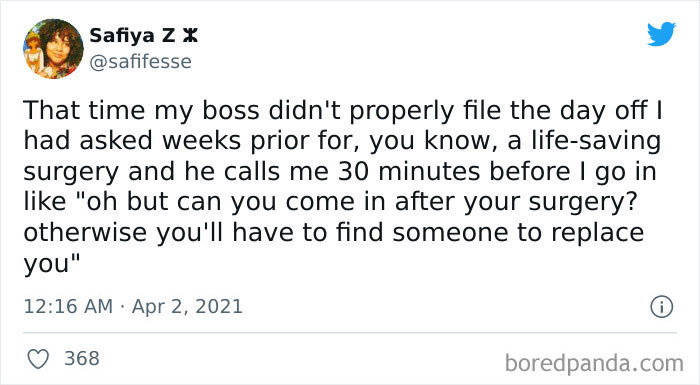
Image credits: safifesse
#2

Image credits: aprilbathes
#3
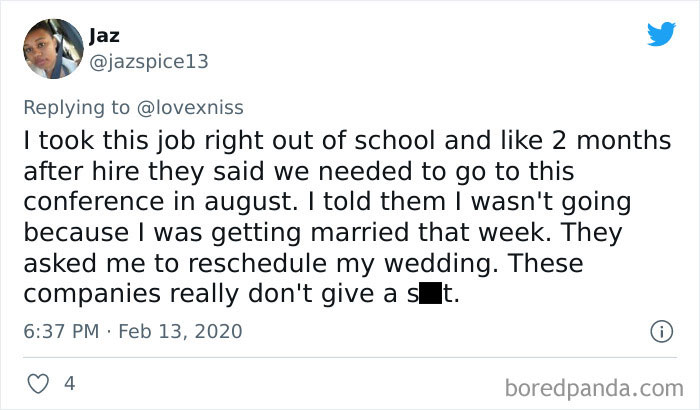
Image credits: jazspice13
When you go on holiday, you reduce your stress levels and improve your health. That’s nothing groundbreakingly new, but vital to remember it. Forbes explains that in the short term, the levels of certain hormones like cortisol and adrenaline get raised by stress, and this can be helpful because it triggers your ‘fight or flight’ response. However, chronic stress can lead to serious health issues like heart disease.
One study that was released by the American Psychological Association came to the conclusion that taking time off from work helps reduce stress. This is because people remove themselves from all the activities and environments that they learned to associate with anxiety. While you’re away from an anxiety-inducing environment, odds are that you’ll be spending more time outdoors, in nature which, of course, is good for your health.
#4

Image credits: logging_on_web
#5

Image credits: mariwhitehurst1
#6
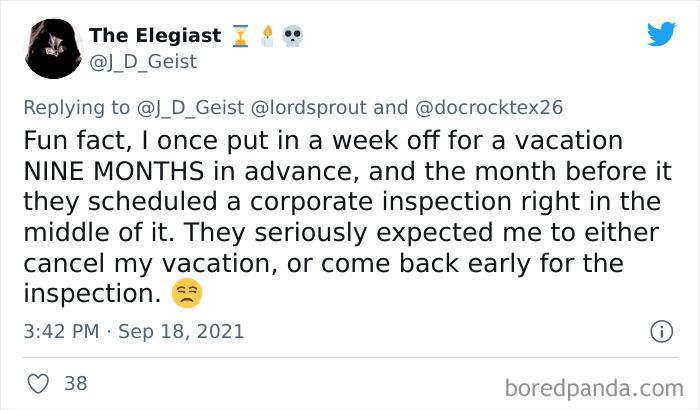
Image credits: J_D_Geist
Professor Eddy Ng previously explained to Bored Panda that it is vital that employees know their rights. “Labor laws or employment standards will require employers to provide regular employees with paid time off for statutory holidays. In the event that an employer requires an employee to work over the holiday period, the employee will be eligible for statutory holiday pay—the amount varies across different jurisdictions,” he explained.
“Employees can and should remind employers of their statutory rights pertaining to holiday or holiday pay should they work. Employers may face fines if they violate labor laws or employment standards,” Professor Ng said.
#7
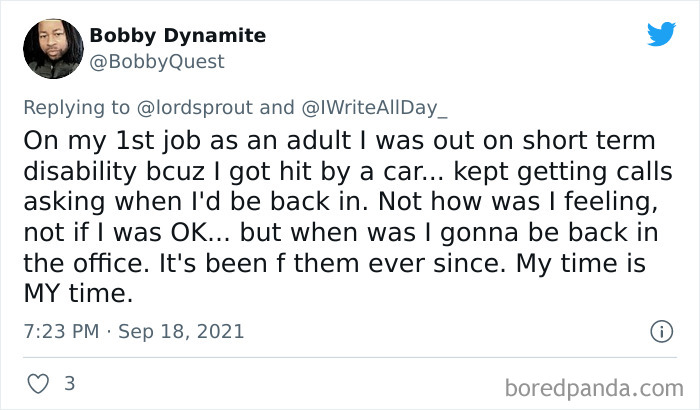
Image credits: BobbyQuest
#8

Image credits: CxExcellence
#9
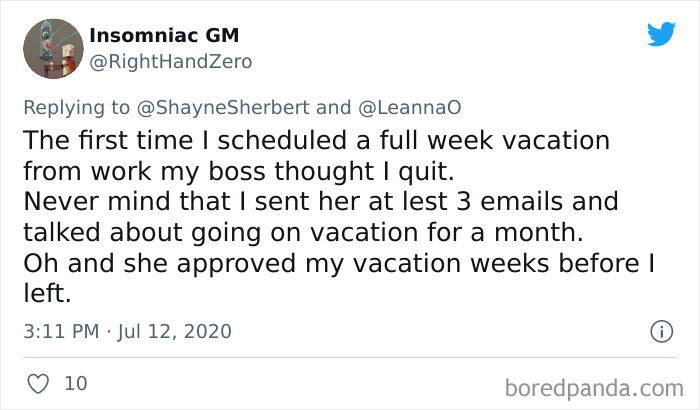
Image credits: RightHandZero
“Employees are entitled to know and should know their rights when working over a holiday period. This information should be provided in employee handbooks and it is good management practice to let employees know of their entitlements. Employees may also contact the Department of Labor that enforces labor laws or employment standards to file a complaint,” the professor said.
#10
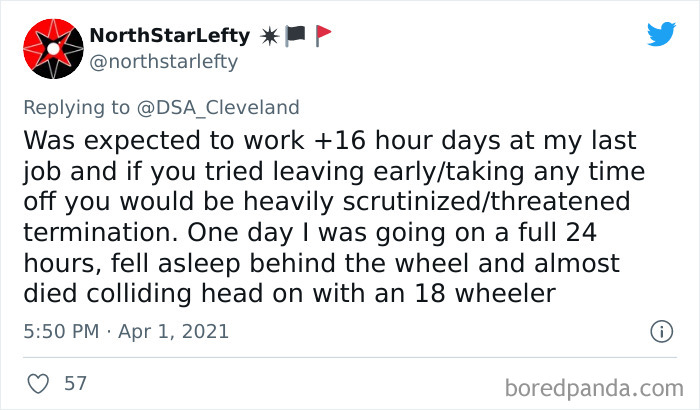
Image credits: northstarlefty
#11
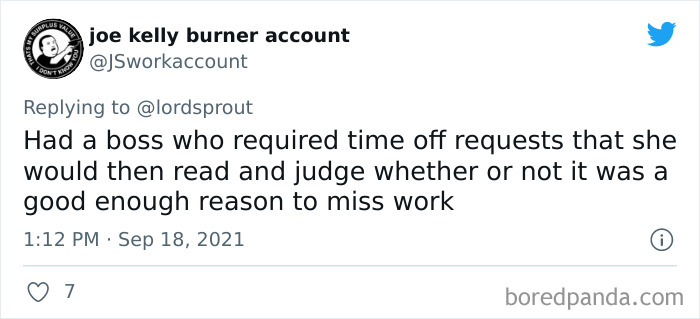
Image credits: JSworkaccount
#12
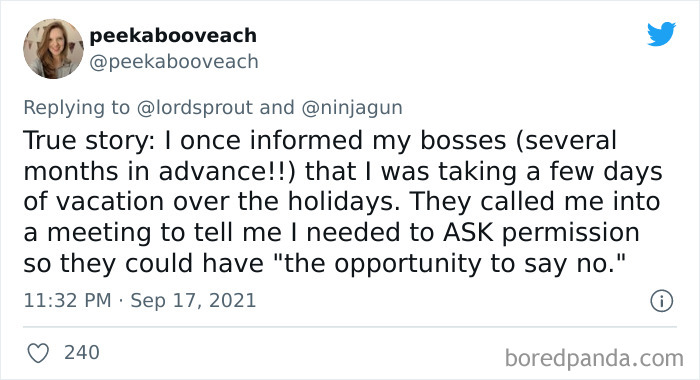
Image credits: peekabooveach
“Sometimes, it is necessary to ask employees to work during a holiday period. However, employers have a duty to accommodate employees who are unable to work over a holiday period for religious observances (religious accommodation). Employees should inform their employers in advance to allow their employers to find replacement workers. US laws also require employers to accommodate employees only to the point of undue hardship, i.e., more than a de minimis cost or burden to the employer.”
#13
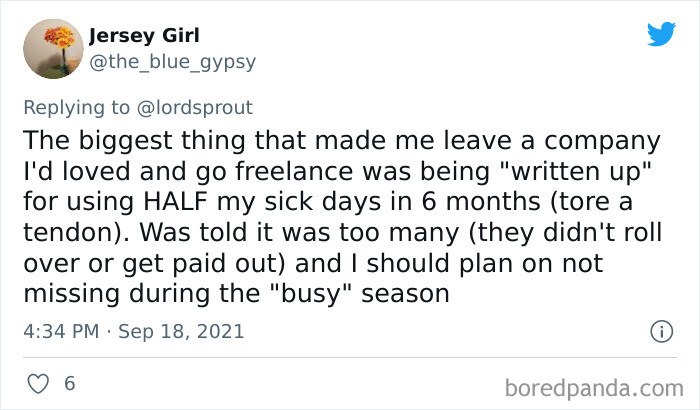
Image credits: the_blue_gypsy
#14

Image credits: Buffalojilll
#15
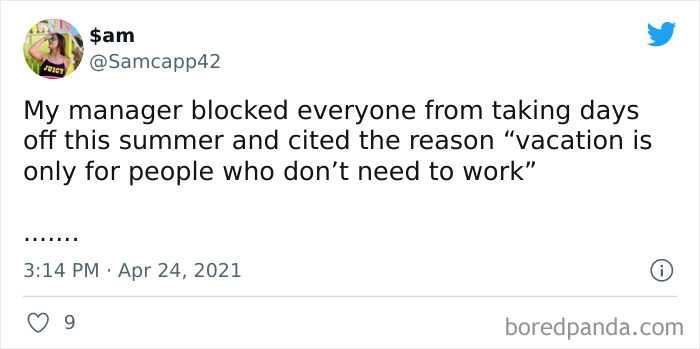
Image credits: Samcapp42
Lordsprout’s thread on Twitter received a lot of attention online. It got over 13.1k likes and was retweeted nearly 2.5k times.
In a perfect world, what Lordsprout says should be how things happen: when we’d need to take a day or a week off, we’d simply notify our employers that, hey, I’m off to enjoy life outside the job for a bit. However, this isn’t a perfect world that we live in.
#16

Image credits: DaveTheWoodGuy
#17
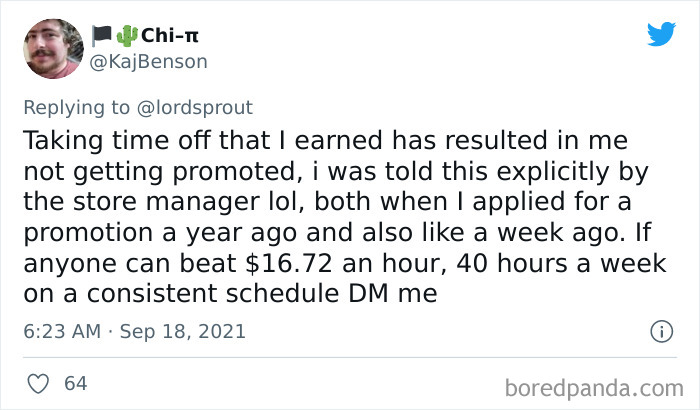
Image credits: KajBenson
#18

Image credits: A_C_McGregor
Unless you’re very high up in your company’s hierarchy or the business fully trusts its workers, you can’t take time off at the drop of a hat (unless it’s a family emergency, of course). If you want a vacation, that means communicating with quite a few people.
#19

Image credits: jordan_stratton
#20
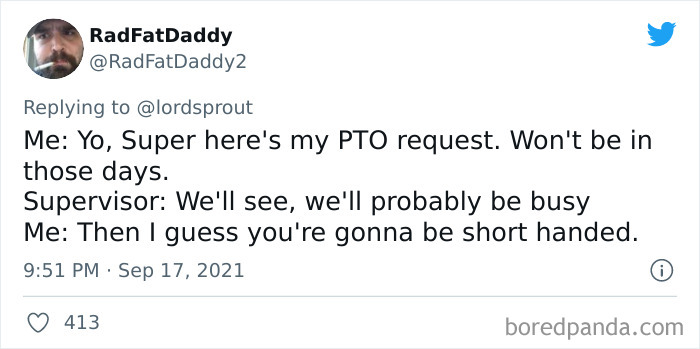
Image credits: RadFatDaddy2
#21

Image credits: J_D_Geist
For instance, odds are that you’ll have to inform both your manager/direct supervisor, as well as a member of your human resources team (if the company has one). Then they’ll check if it’s not an incredibly busy time for the company and if there are enough people on the team to get the job done with you being gone for a bit.
Checking in with so many people for time off, which you should get depending on your contract, can seem like quite a hassle. However, it’s become pretty standard practice and, usually, there are no issues at all. Naturally, some industries have very busy periods of time that can last a month or a few, so managers tend to dissuade their employees from taking time off then.
#22

Image credits: Lionof_Allah
#23
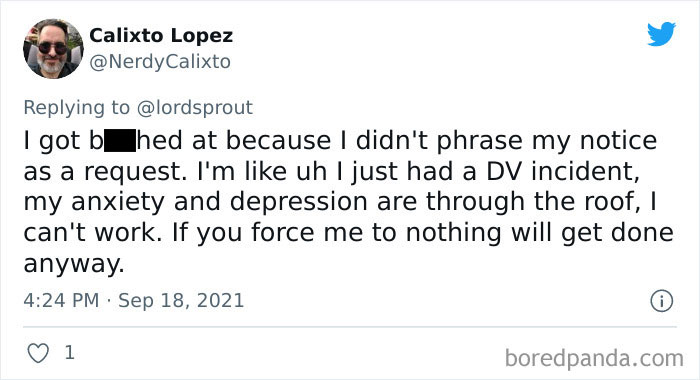
Image credits: NerdyCalixto
#24
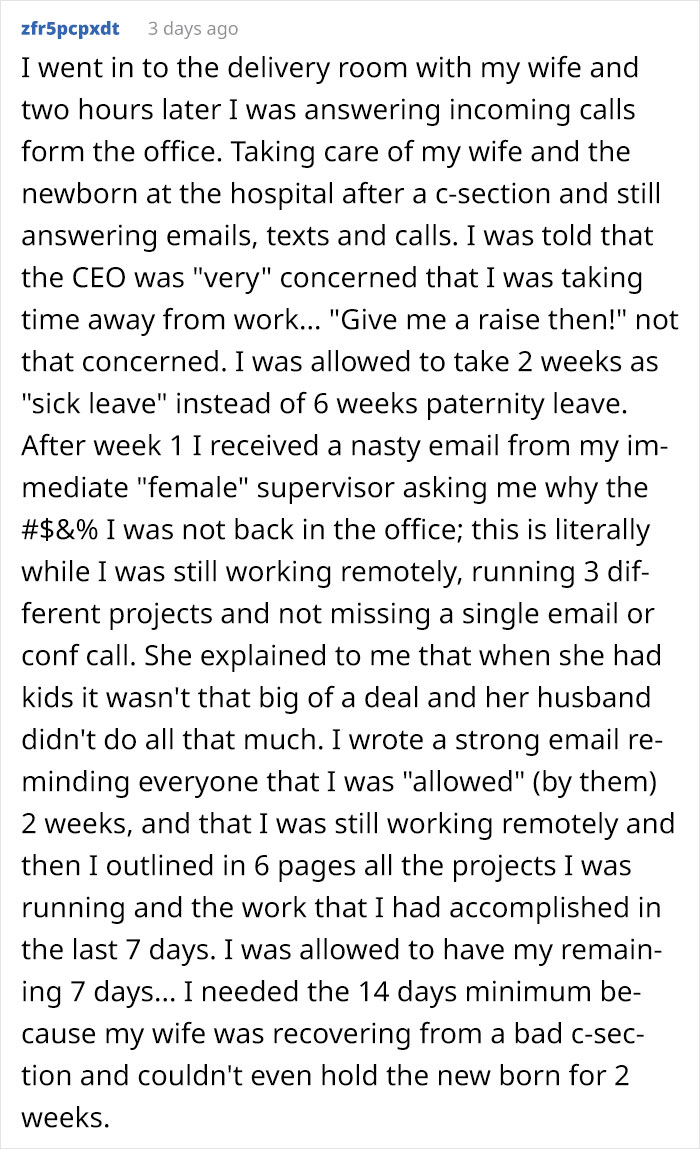
Image credits: zfr5pcpxdt
It might not sound fair if your manager denies you time off during the busiest time of the year for the company, however, the issue here is about proper communication. If everyone knows upfront that everyone’s going to be incredibly busy around the holidays, then it’s easier to juggle your vacation plans and go before/after the busy season.
#25
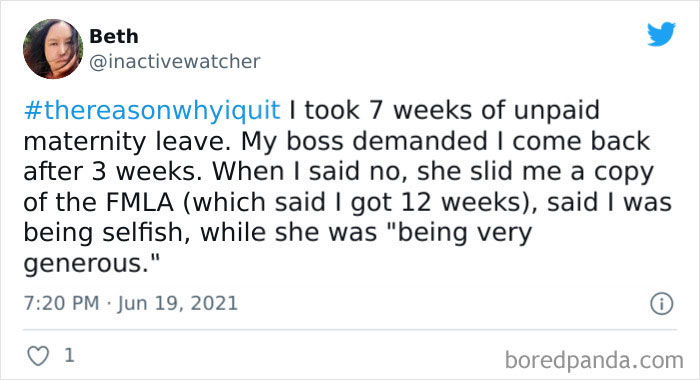
Image credits: inactivewatcher
#26

Image credits: hydvl
#27
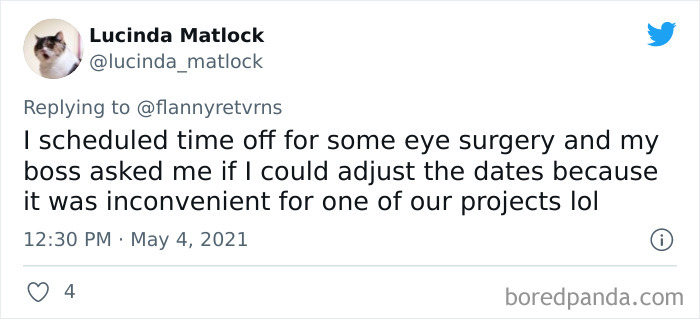
Image credits: lucinda_matlock
On the flip side, if the rules regarding time off are incredibly opaque and kept secret, then odds are that you’ll have a lot of angry workers on your hands. The reason for denying someone time off has to be water-tight. It can’t be some random excuse like, “No, you can’t take time off because I said so” or, “No, it’s all hands on deck” if it’s actually just business as usual.
#28
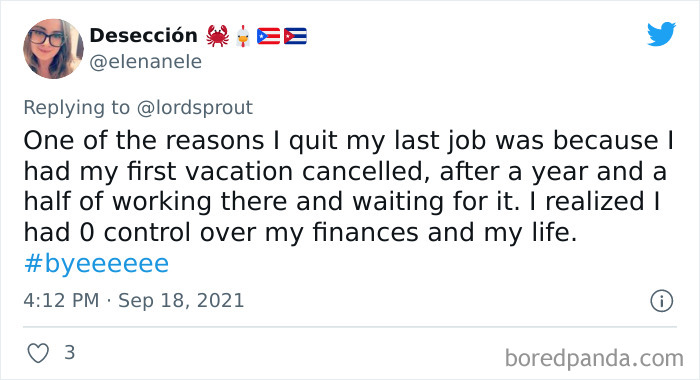
Image credits: eIenaneIe
#29
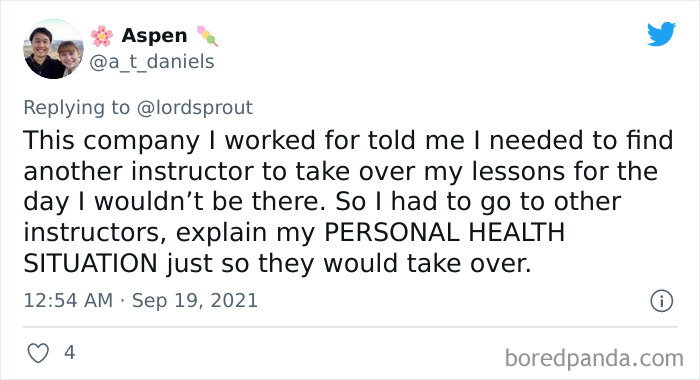
Image credits: a_t_daniels
#30
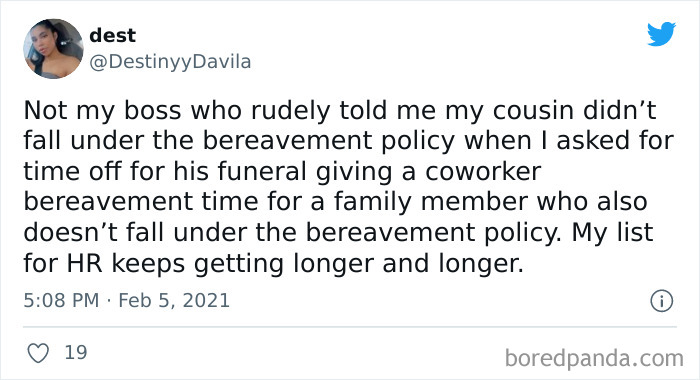
Image credits: DestinyyDavila
Working without proper breaks can lead to burnout. If you can’t spend quality time with your family, can’t find the energy to take care of your health, and can’t find the time for your passion projects and hobbies, you won’t have much motivation to continue working at your job. Aside from your wage, of course. However, working for money alone won’t inspire you to do your best and will likely leave you working at minimum power. Take the burnout out of the equation and you might have someone motivated to reach for the stars.
#31
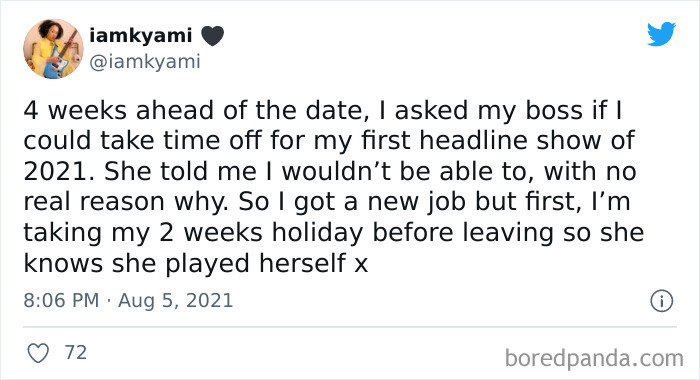
Image credits: iamkyami
#32
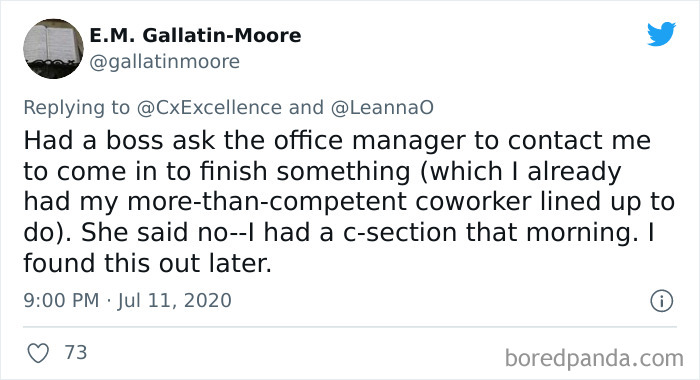
Image credits: gallatinmoore
#33
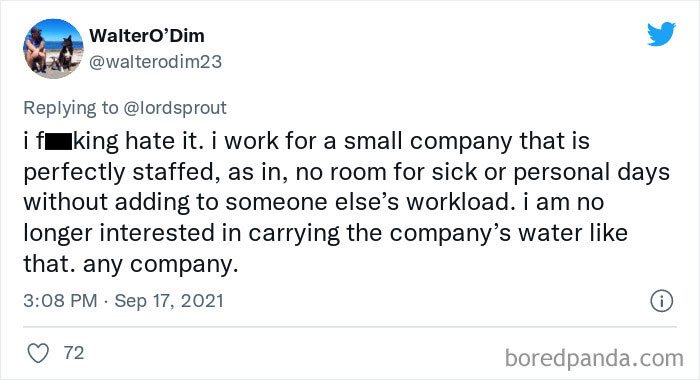
Image credits: walterodim23
#34

Image credits: MuseofIre
#35
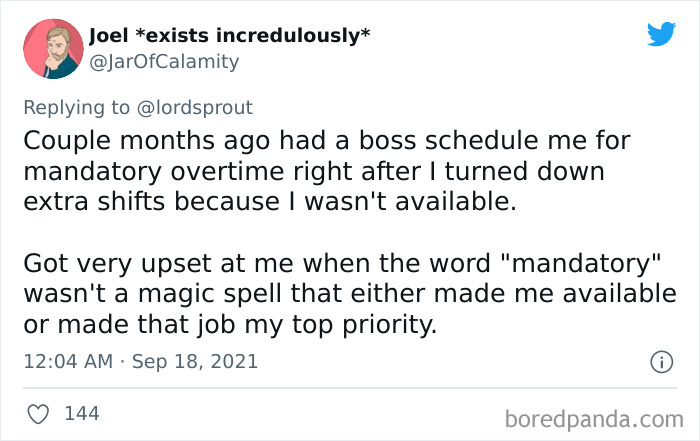
Image credits: JarOfCalamity
#36

Image credits: keeperofthekept
#37
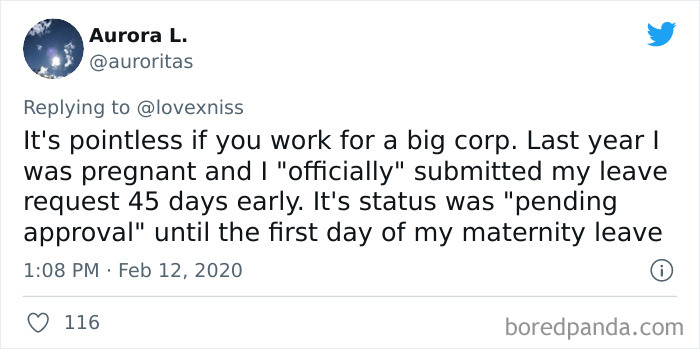
Image credits: auroritas
#38
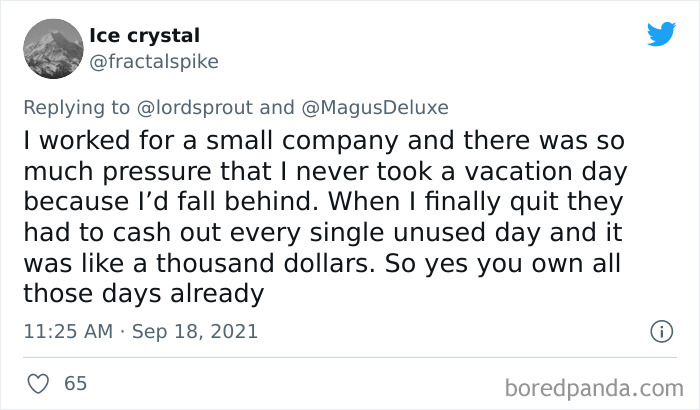
Image credits: fractalspike
#39
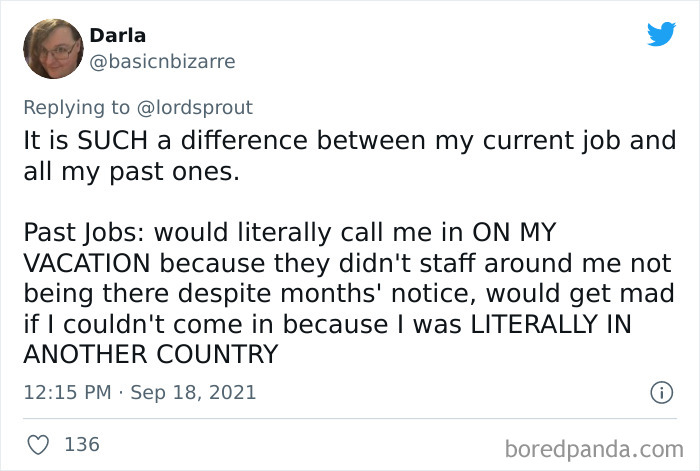
Image credits: basicnbizarre
#40

Image credits: PsykodeliksNSFW

No comments